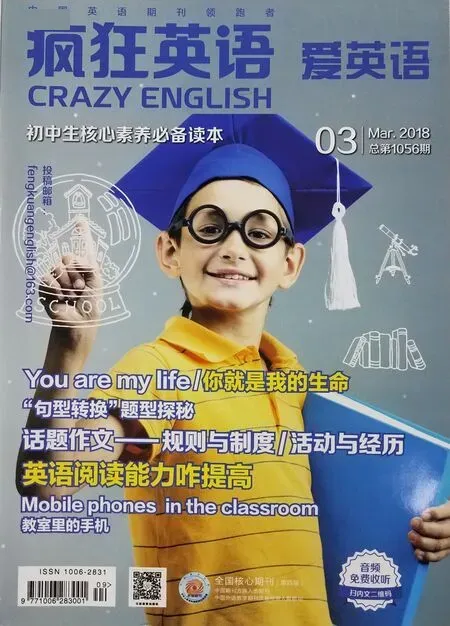?Mobile phones in the classroom
by Emily/陳望珍(譯)
□語(yǔ)篇導(dǎo)讀
在大街上我們總能看到一些低頭玩手機(jī)的人,目前對(duì)手機(jī)存有依賴的人群幾乎覆蓋所有年齡段。許多學(xué)生都將手機(jī)帶入校園,甚至在課堂上使用手機(jī)。對(duì)于部分學(xué)生來說,手機(jī)不再是工具而是一種玩具。學(xué)生在課堂上使用手機(jī)的弊遠(yuǎn)遠(yuǎn)大于利,具體情況如何呢?讓我們一起讀讀下文。
There is a piece of bad news for students who like to use their mobile phones when they study.A new research shows that students do not learn very well when they are texting and checking their social media accounts in class.The research is called,“Mobile Phones in the Classroom:Examining the Effects of Texting,Twitter,and Message on Student Learning”.Researchers watched 145 American university students in the classroom.Some of the students used their mobile phones during class,while the others had their phones turned off.The head researcher,Dr.Jeffrey,said while the teacher was talking,students who did not use their mobile phones got higher scores on tests they took at the end of the class.
Dr.Jeffrey said that for a teacher,one of the biggest challenges in class is to keep students studying all the time.He said,many students felt they needed to be online and check messages even if they had important work to do in class.
The researchers said it was very common for students to be physically present in class,but mentally absent because they were using their mobiles.Dr.Jeffrey said teachers were fighting a“l(fā)osing battle”,because students were more interested in social media than learning.
The London School of Economics did a study in England and found that test scores increased by six percent after students didn’t use mobile phones in class.

◆詞語(yǔ)積淀
1.text/tekst/vt.發(fā)短信
2.account/?'ka?nt/n.賬戶;解釋;賬目,賬單
3.physically/'f?z?kli/adv.身體上;身體上地
4.economics/i:k?'n?m?ks/n.經(jīng)濟(jì)學(xué);國(guó)家的經(jīng)濟(jì)狀況
5.mentally/'ment?li/adv. 精神上;智力上;心理上
6.losing battle必?cái)≈畱?zhàn)
7.test scores考試分?jǐn)?shù);測(cè)試成績(jī)
8....percent百分之……
◆典句賞析
1.There is a piece of bad news for students who like to use their mobile phones when they study.對(duì)于那些喜歡邊學(xué)習(xí)邊用手機(jī)的學(xué)生來說有一個(gè)壞消息。
(1)主句是there be句型,這類句型的謂語(yǔ)動(dòng)詞be的單復(fù)數(shù)形式應(yīng)該與其相鄰的主語(yǔ)保持一致。當(dāng)相鄰的主語(yǔ)是不可數(shù)名詞或單數(shù)名詞時(shí),謂語(yǔ)動(dòng)詞用is/was;當(dāng)相鄰的主語(yǔ)是可數(shù)名詞的復(fù)數(shù)形式時(shí),謂語(yǔ)動(dòng)詞用are/were。
(2)該句是一個(gè)多重復(fù)合句,句子who like to use their mobile phones when they study是定語(yǔ)從句,修飾先行詞students,關(guān)系代詞who在從句中作主語(yǔ);when在此處作為從屬連詞,在定語(yǔ)從句中引導(dǎo)時(shí)間狀語(yǔ)從句when they study。
【即時(shí)嘗試】哭的時(shí)候還在吃東西的孩子處于極大的危險(xiǎn)中。
2.The head researcher,Dr.Jeffrey,said while the teacher was talking,students who did not use their mobile phones got higher scores on tests they took at the end of the class.首席研究員Jeffrey博士說,當(dāng)老師講課時(shí),不使用手機(jī)的學(xué)生在課程結(jié)束后的檢測(cè)中的得分更高。
(1)at the end of是固定短語(yǔ),意為“在……結(jié)束時(shí);在……末尾”,其后既可以接表示時(shí)間的詞,也可以接表示地點(diǎn)的詞。
(2)此句是多重復(fù)合句。賓語(yǔ)從句里含有時(shí)間狀語(yǔ)從句,而時(shí)間狀語(yǔ)從句里又含有兩個(gè)定語(yǔ)從句。while及其后的部分是賓語(yǔ)從句;while the teacher was talking是時(shí)間狀語(yǔ)從句;who did not use their mobile phones是定語(yǔ)從句,修飾先行詞students;they took也是定語(yǔ)從句,修飾先行詞tests。
【即時(shí)嘗試】他說當(dāng)父母不在家時(shí),嚴(yán)格要求自己的孩子擁有更好的未來。
(答案見63頁(yè))
譯文助讀
對(duì)于那些喜歡邊學(xué)習(xí)邊用手機(jī)的學(xué)生來說有一個(gè)壞消息。一項(xiàng)新的研究顯示,課堂上,一邊發(fā)短信和查看社交帳號(hào)的學(xué)生,他們的學(xué)習(xí)成績(jī)不好。這項(xiàng)研究被叫作“教室里的手機(jī):檢測(cè)短信、推特和信息對(duì)學(xué)生學(xué)習(xí)的影響”。研究人員調(diào)查了145名美國(guó)大學(xué)生在課堂上的表現(xiàn)。一些學(xué)生在上課期間使用手機(jī),而其他的學(xué)生上課時(shí)將手機(jī)關(guān)機(jī)。首席研究員Jeffrey博士說,當(dāng)老師講課時(shí),不使用手機(jī)的學(xué)生在課程結(jié)束后的檢測(cè)中的得分更高。
Jeffrey博士說,對(duì)老師來說,課堂上的最大挑戰(zhàn)之一就是讓學(xué)生一直處于學(xué)習(xí)狀態(tài)。他說,許多學(xué)生覺得他們需要上網(wǎng)看信息,即使他們?cè)谡n堂上有重要的工作要做。
研究人員說由于使用手機(jī),學(xué)生身在課堂心不在焉的狀態(tài)非常普遍。Jeffrey博士說老師們正在進(jìn)行一場(chǎng)毫無成功希望的斗爭(zhēng),因?yàn)閷W(xué)生們對(duì)社交媒體比對(duì)學(xué)習(xí)更感興趣。
倫敦經(jīng)濟(jì)學(xué)院在英格蘭進(jìn)行了一項(xiàng)調(diào)查,發(fā)現(xiàn)學(xué)生在課堂上不使用手機(jī)以后,(學(xué)生們)考試的分?jǐn)?shù)提高了6%。

